Unit5 Can you come to my party?经典例题与讲解:SectionA
unit 5《can you come to my party》知识点总结(人教新目标八年级上)doc

Unit 5 Can you come to my party?重点句子及知识点讲解1.--- Can you come to my party ?---Sure , I’d love(like) to . / I’m sorry , I can’t . I have to hel p my parents .⑴情态动词can的用法1. (表示能力、功能)能,会The classroom can seat thirty students. 这教室能坐三十位学生。
June can drive now. 琼现在会开车了。
2. (表示可能性)可能,可能会I think the work can be completed ahead of time. 我认为这项工作能提前完成。
3. (表示允许、请求)可以You can't take the book out of the room. 你不可以将这本书拿出室外。
Can I use your pen? 我可以用一下你的笔吗?4. (表示命令)必须If you won't keep quiet you can get out. 你如不保持安静,就请你走。
5. (表示偶然发生的可能性)有时会It can be quite windy there, especially in spring. 那里有时容易刮风,特别在春季。
6. (表示惊讶)究竟;竟至于What can it possibly be? 到底那是怎么一回事?n. 1. (食物)罐头 2. 金属容器情态动词can在这里起征求对方意见的作用。
Can you play tennis with me ?⑵can 和be able to 的用法区别1)can could 表示能力;可能(过去时用could), 只用于现在式和过去式(could)。
be able to可以用于各种时态。
表示现在或过去能力时两者可以互换。
新目标八年级英语上册Unit5 Can you come to my party?讲解与练习
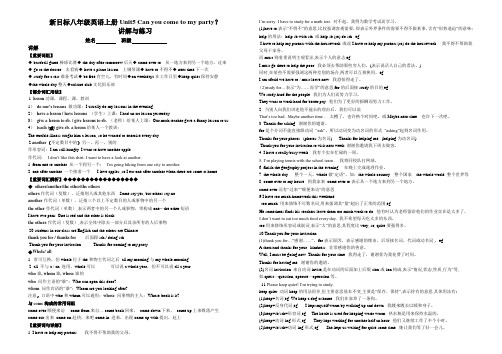
新目标八年级英语上册Unit5 Can you come to my party?讲解与练习姓名班级讲解【重要词组】◆ baseball game棒球比赛◆ the day after tomorrow后天◆ come over to从一地方来到另一个地方,过来◆ go to the doctor去看病◆ have a piano lesson上钢琴课◆ have to不得不◆ next time下一次◆ study for a test准备考试◆ be free有空儿,有时间◆on weekdays在工作日里◆keep quiet保持安静◆the whole day整天◆culture club文化俱乐部【部分词汇用法】1. lesson功课,课程,课,教训1). do one’s lessons做功课:I usually do my lessons in the evening.2). have a lesson / have lessons(学生)上课:I had an art lesson yesterday.3). give a lesson to sb. / give lessons to sb.(老师)给某人上课:Our math teacher gave a funny lesson to us. 4). teach (或) give sb. a lesson给某人一个教训:The terrible illness taught him a lesson, so he wanted to exercise every day.2.another(不定数目中的)另一,再一,别的作形容词:I am still hungry. I want to have another apple.作代词:I don’t like this shirt. I want to have a look at another.1. from one to another 从一个到另一个:I’m going hiking from one city to another.2. one after another 一个接着一个I love apples, so I eat one after another when there are some at home.【重要词汇辨析】◆◆◆◆◆◆◆◆◆◆◆◆◆◆◆◆◆◆others/another/the other/the othersothers作代词(复数),泛指别人或其他东西Some say yes, but others say no.another作代词(单数),泛指三个以上不定数目的人或事物中的另一个the other作代词(单数),表示两者中的另一个人或事物,常构成one…the other短语I have two pens. One is red and the other is black.the others作代词(复数),表示全体中除去一部分后其余所有的人后事物20 students in our class are English and the others are Chinese.thank you for / thanks for 后面跟sth./ doing sth.Thank you for your invitation. Thanks for coming to my party.◆Whole/ all1. 常可互换,但whole位于the和物主代词之后all my morning与my whole morning2. all 不与a / an 连用,whole可以可以说a whole year,但不可以说all a yearwho谁, whom谁, whose谁的who 问作主语的“谁”:Who can open this door?whom 问作宾语的“谁”:Whom are you looking after?注意:口语中who和whom可以通用;whose 问事物的主人:Whose book is it?与come构成的常用词组come over顺便来访come from来自… come back回来,come down下来,come up上来败落产生come out出来come on赶快,来吧come in 进来,出现 come up with提出,赶上【重要词句详解】1.I have to help my parents . 我不得不帮助我的父母。
八年级上册英语Unit5-can-you-come-to-my-party知识点总结
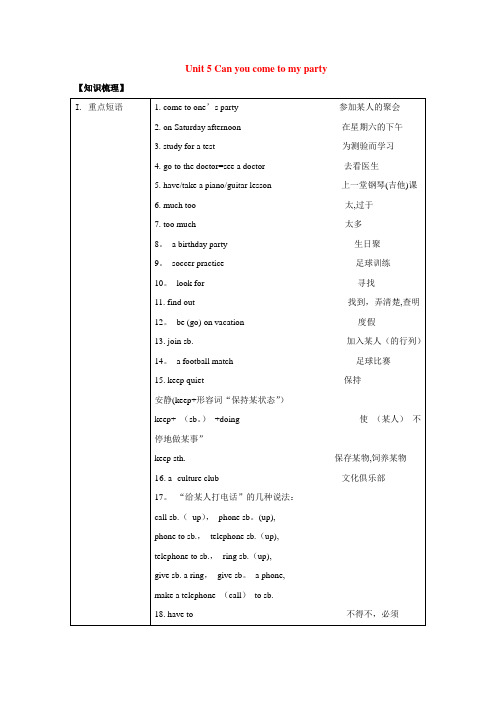
Unit 5 Can you come to my party【知识梳理】I. 重点短语 1. come to one’s party 参加某人的聚会2. on Saturday afternoon 在星期六的下午3. study for a test 为测验而学习4. go to the doctor=see a doctor 去看医生5. have/take a piano/guitar lesson 上一堂钢琴(吉他)课6. much too 太,过于7. too much 太多8。
a birthday party 生日聚9。
soccer practice 足球训练10。
look for 寻找11. find out 找到,弄清楚,查明12。
be (go) on vacation 度假13. join sb. 加入某人(的行列)14。
a football match 足球比赛15. keep quiet 保持安静(keep+形容词“保持某状态”)keep+ (sb。
)+doing 使(某人)不停地做某事”keep sth. 保存某物,饲养某物16. a culture club 文化俱乐部17。
“给某人打电话”的几种说法:call sb.(up),phone sb。
(up),phone to sb.,telephone sb.(up),telephone to sb.,ring sb.(up),give sb. a ring,give sb。
a phone,make a telephone (call)to sb.18. have to 不得不,必须19。
the day after tomorrow 后天20。
a science report 科学报告II. 重要句型邀请用语1. Can you come to my party?= Would you like to come to my party?肯定回答:Sure,I’d love to。
八年级英语unit 5 can you come to my party 人教版(新目标)知识精讲
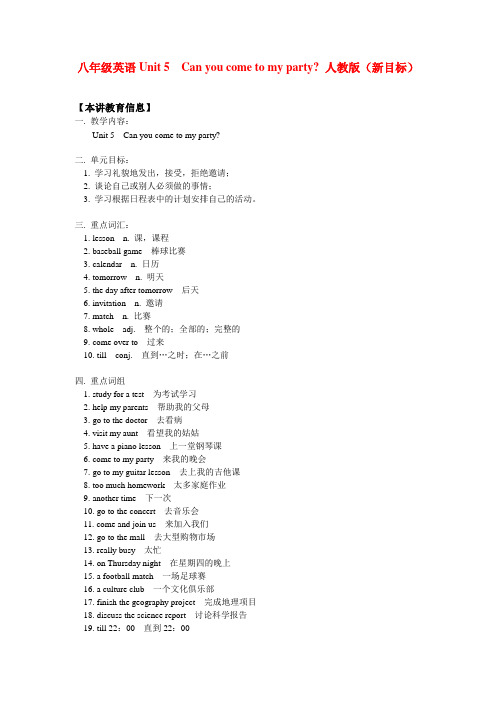
八年级英语Unit 5 Can you come to my party? 人教版(新目标)【本讲教育信息】一. 教学内容:Unit 5 Can you come to my party?二. 单元目标:1. 学习礼貌地发出,接受,拒绝邀请;2. 谈论自己或别人必须做的事情;3. 学习根据日程表中的计划安排自己的活动。
三. 重点词汇:1. lesson n. 课,课程2. baseball game 棒球比赛3. calendar n. 日历4. tomorrow n. 明天5. the day after tomorrow 后天6. invitation n. 邀请7. match n. 比赛8. whole adj. 整个的;全部的;完整的9. come over to 过来10. till conj. 直到…之时;在…之前四. 重点词组1. study for a test 为考试学习2. help my parents 帮助我的父母3. go to the doctor 去看病4. visit my aunt 看望我的姑姑5. have a piano lesson 上一堂钢琴课6. come to my party 来我的晚会7. go to my guitar lesson 去上我的吉他课8. too much homework 太多家庭作业9. another time 下一次10. go to the concert 去音乐会11. come and join us 来加入我们12. go to the mall 去大型购物市场13. really busy 太忙14. on Thursday night 在星期四的晚上15. a football match 一场足球赛16. a culture club 一个文化俱乐部17. finish the geography project 完成地理项目18. discuss the science report 讨论科学报告19. till 22:00 直到22:00五. 重点句子1. Can you come to my party?I'm sorry. I can't. I have to help my mom. /Sure, I'd love to.2. Can she go to the movies? No, she can't.She's playing soccer.3. Can he go to the baseball game?No, he can't. He has to study.4. Can they go to the concert? No, they can't.They're going to a party.5. What are you doing on Tuesday evening?I'm baby sitting my younger sister.六. 重,难点解析1. 情态动词can的用法(1)表示能力,意思是“能”eg Can you sing?你会唱歌吗?Yes, I can.是的,我会。
鲁教版七年级英语下册Unit5 Can you come to my party? - Section B习题(附答案)
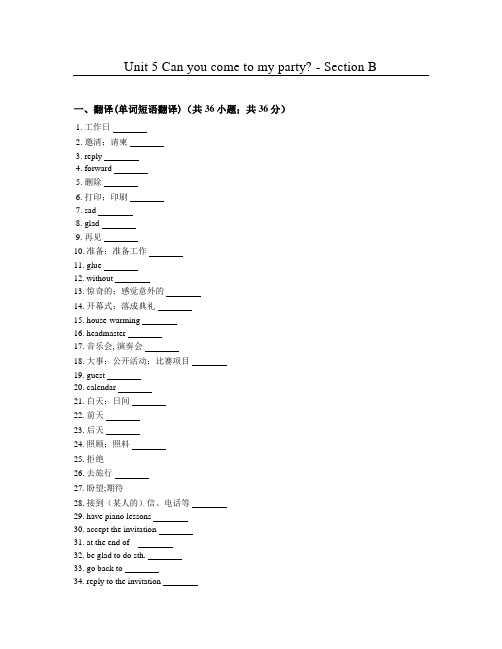
Unit 5 Can you come to my party? - Section B一、翻译(单词短语翻译)(共36小题;共36分)1. 工作日2. 邀清;请柬3. reply4. forward5. 删除6. 打印;印刷7. sad8. glad9. 再见10. 准备;准备工作11. glue12. without13. 惊奇的;感觉意外的14. 开幕式;落成典礼15. house-warming16. headmaster17. 音乐会, 演奏会18. 大事;公开活动;比赛项目19. guest20. calendar21. 白天;日间22. 前天23. 后天24. 照顾;照料25. 拒绝26. 去旅行27. 盼望;期待28. 接到(某人的)信、电话等29. have piano lessons30. accept the invitation31. at the end of32. be glad to do sth.33. go back to34. reply to the invitation35. make an invitation36. go to the concert二、翻译(根据中文提示完成句子)(共12小题;共12分)37. --- 今天是几号星期几?--- 今天是14号星期一。
--- today?--- Monday 14th.38. 多棒的一个主意啊!great idea it is!39. 她帮我把英语提高了这么多。
She helped my English so much.40. 看到她走我很伤心。
I'm her .41. 关于如何去做我已经有了一个很好的想法。
I have a great idea to do that.42. 我们全家这个月末要到武汉去看望我的叔叔和婶婶。
Our family is taking a trip to Wuhan at the end of this month my uncle and aunt.43. 我很乐意帮忙分担些聚会的准备工作。
Unit 5 Can you come to my party_单元综合-1.doc
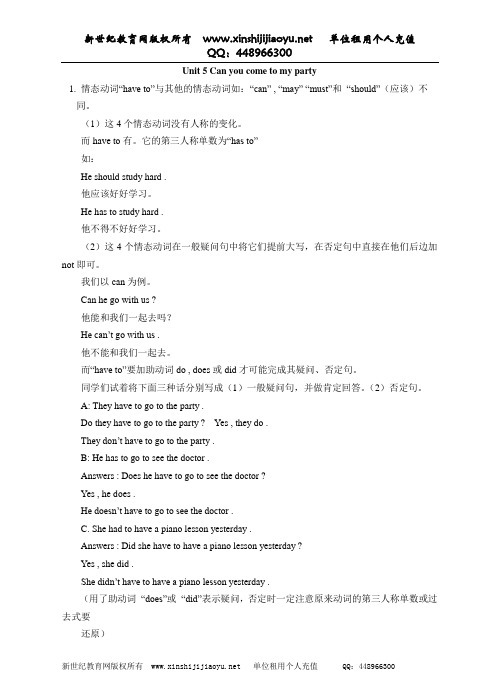
Unit 5 Can you come to my party1. 情态动词“have to”与其他的情态动词如:“can” , “may” “must”和“should”(应该)不同。
(1)这4个情态动词没有人称的变化。
而have to有。
它的第三人称单数为“has to”如:He should study hard .他应该好好学习。
He has to study hard .他不得不好好学习。
(2)这4个情态动词在一般疑问句中将它们提前大写,在否定句中直接在他们后边加not即可。
我们以can为例。
Can he go with us ?他能和我们一起去吗?He can’t go with us .他不能和我们一起去。
而“have to”要加助动词do , does或did才可能完成其疑问、否定句。
同学们试着将下面三种话分别写成(1)一般疑问句,并做肯定回答。
(2)否定句。
A: They have to go to the party .Do they have to go to the party ? Yes , they do .They don’t have to go to the party .B: He has to go to see the doctor .Answers : Does he have to go to see the doctor ?Yes , he does .He doesn’t have to go to see the doctor .C. She had to have a piano lesson yesterday .Answers : Did she have to have a piano lesson yesterday ?Yes , she did .She didn’t have to have a piano less on yesterday .(用了助动词“does”或“did”表示疑问,否定时一定注意原来动词的第三人称单数或过去式要还原)2. I have to help my parents .我不得不帮助我的父母。
Unit 5 Can you come to my party重难点讲析

Unit 5 Can you come to my party(二)一.I have tennis training with the school team.我有校队的网球训练。
解析:training 意为“训练”,用作不可数名词。
记住以下三个句型:①have training in 在…方面有训练eg I didn’t have any training in drawing.我在绘画方面没有受过训练。
2 be in training for 为…训练Eg I’m to be in training for a race.我将为赛跑训练3.train sb to do sth.训练某人做某事。
Eg we should train the children to be good citizens.我们应该培养孩子成为好公民。
随堂练习:(1)他为什么要训练游泳?_______ is he ______ ______ ______ swimming?(2)这些日子他再训练他儿子学习画画。
These days he is ______ his son ______ ______ drawing .(3)你受过绘画方面的训练吗?Have you had any ______ ______ ______?二.Please call me after the vacation . 过完假期,请给我打电话。
解析:call sb.意为“打电话给某人”,其他表示打电话的短语有:call sb. up ; give sb. a call; make sb. a phone cal l; phone sb.随堂练习Please ______ when you reach Beijing.A. call up meB.call me upC.ring up meD. give a ring for me 三.Please be quite.解析:这是一个祈使句。
人教版-英语-八上-5单元 Can you come to my party 知识精讲)

初二英语Unit 5 Can you come to my party? 人教版(新目标)【本讲教育信息】一. 教学内容:Unit 5 Can you come to my party?二. 单元目标:1. 学习礼貌地发出,接受,拒绝邀请;2. 谈论自己或别人必须做的事情;3. 学习根据日程表中的计划安排自己的活动。
三. 重点词汇:1. lesson n. 课,课程2. baseball game 棒球比赛3. calendar n. 日历4. tomorrow n. 明天5. the day after tomorrow 后天6. invitation n. 邀请7. match n. 比赛8. whole adj. 整个的;全部的;完整的9. come over to 过来10. till conj. 直到…之时;在…之前四. 重点词组1. study for a test 为考试学习2. help my parents 帮助我的父母3. go to the doctor 去看病4. visit my aunt 看望我的姑姑5. have a piano lesson 上一堂钢琴课6. come to my party 来我的晚会7. go to my guitar lesson 去上我的吉他课8. too much homework 太多家庭作业9. another time 下一次10. go to the concert 去音乐会11. come and join us 来加入我们12. go to the mall 去大型购物市场13. really busy 太忙14. on Thursday night 在星期四的晚上15. a football match 一场足球赛16. a culture club 一个文化俱乐部17. finish the geography project 完成地理项目18. discuss the science report 讨论科学报告19. till 22:00 直到22:00五. 重点句子1. Can you come to my party?I'm sorry. I can't. I have to help my mom. /Sure, I'd love to.2. Can she go to the movies? No, she can't.She's playing soccer.3. Can he go to the baseball game?No, he can't. He has to study.4. Can they go to the concert? No, they can't.They're going to a party.5. What are you doing on Tuesday evening?I'm baby sitting my younger sister.六. 重,难点解析1. 情态动词can的用法(1)表示能力,意思是“能”eg Can you sing?你会唱歌吗?Yes, I can.是的,我会。
Unit 5 Can you come to my party

Unit 5 Can you come to my party ?例1 —Can you come to my party?—_____________A. No, I don’tB. Sure , that’s rightC. Sure ,I’d love toD. Quiet well【解题思路】选C。
此题考查对邀请用语的回答。
对邀请用语的回答,肯定回答用“Y es/Sure/ Certainly/ I’d love to”; 否定回答,就应委婉的说:“I’m sorry, I can’t.”例2 Thank you for ___________me to your party.A. takeB. askingC. to helpD. telling【解题思路】选B。
此题考查thank you/thanks for…句型的运用。
for后面一般有两种情况:(1)名词,如Thanks for your help/ invitation.(2)动词+ing,如Thanks for your helping me/ inviting me to your party.例3 -- Mum, do I need to bring an umbrella with me?--I’m afraid you_________. It’s raining hard.A. will have toB. needC. canD. needn’t【解题思路】此题中的need是行为动词,肯定回答可用助动词do代替,也可用need to。
也可用have to代替,但have to强调客观上的必要性。
选A例4 --Let’s go and play football, ______ ?--That’s wonderfu l. A. will you B. do you C. won’t you D. shall we【解题思路】选D。
初中英语八年级教案Unit 5:Can you come to my party?
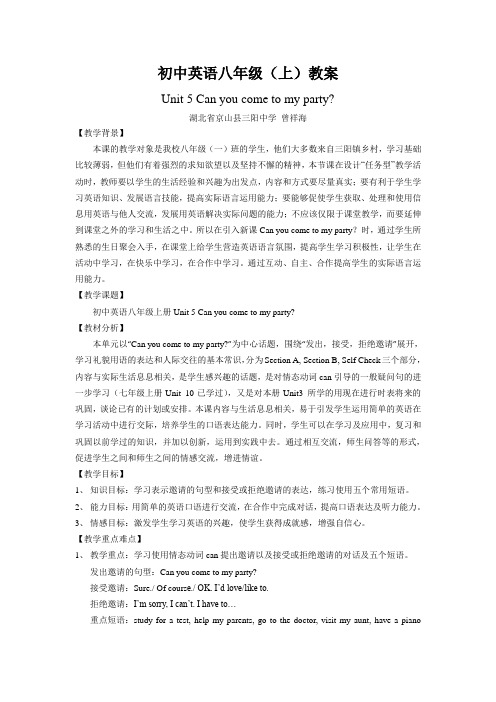
初中英语八年级(上)教案Unit 5 Can you come to my party?湖北省京山县三阳中学曾祥海【教学背景】本课的教学对象是我校八年级(一)班的学生,他们大多数来自三阳镇乡村,学习基础比较薄弱,但他们有着强烈的求知欲望以及坚持不懈的精神,本节课在设计“任务型”教学活动时,教师要以学生的生活经验和兴趣为出发点,内容和方式要尽量真实;要有利于学生学习英语知识、发展语言技能,提高实际语言运用能力;要能够促使学生获取、处理和使用信息用英语与他人交流,发展用英语解决实际问题的能力;不应该仅限于课堂教学,而要延伸到课堂之外的学习和生活之中。
所以在引入新课Can you come to my party?时,通过学生所熟悉的生日聚会入手,在课堂上给学生营造英语语言氛围,提高学生学习积极性,让学生在活动中学习,在快乐中学习,在合作中学习。
通过互动、自主、合作提高学生的实际语言运用能力。
【教学课题】初中英语八年级上册Unit 5 Can you come to my party?【教材分析】本单元以“Can you come to my party?”为中心话题,围绕“发出,接受,拒绝邀请”展开,学习礼貌用语的表达和人际交往的基本常识,分为Section A, Section B, Self Check三个部分,内容与实际生活息息相关,是学生感兴趣的话题,是对情态动词can引导的一般疑问句的进一步学习(七年级上册Unit 10已学过),又是对本册Unit3 所学的用现在进行时表将来的巩固,谈论已有的计划或安排。
本课内容与生活息息相关,易于引发学生运用简单的英语在学习活动中进行交际,培养学生的口语表达能力。
同时,学生可以在学习及应用中,复习和巩固以前学过的知识,并加以创新,运用到实践中去。
通过相互交流,师生问答等的形式,促进学生之间和师生之间的情感交流,增进情谊。
【教学目标】1、知识目标:学习表示邀请的句型和接受或拒绝邀请的表达,练习使用五个常用短语。
八年级英语上册 unit 5 can you come to my party重难点解析 人教新目标版
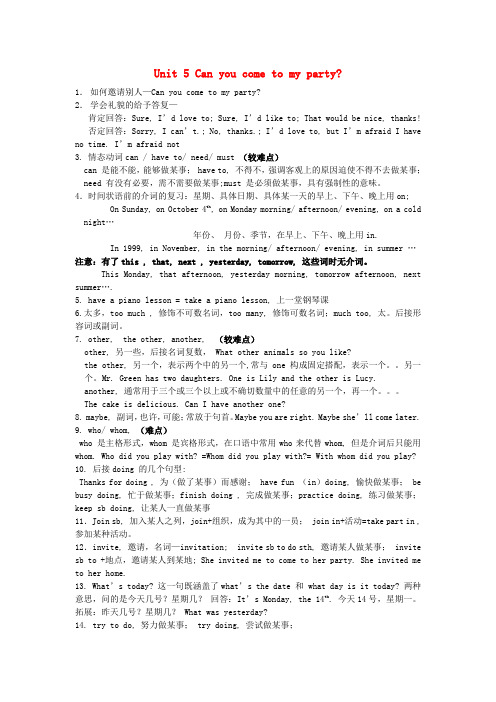
Unit 5 Can you come to my party?1.如何邀请别人—Can you come to my party?2.学会礼貌的给予答复—肯定回答:Sure, I’d love to; Sure, I’d like to; That would be nice, thanks!否定回答:Sorry, I can’t.; No, thanks.; I’d love to, but I’m afraid I have no time. I’m afraid not3. 情态动词can / have to/ need/ must (较难点)can 是能不能,能够做某事; have to, 不得不,强调客观上的原因迫使不得不去做某事;need 有没有必要,需不需要做某事;must 是必须做某事,具有强制性的意味。
4.时间状语前的介词的复习:星期、具体日期、具体某一天的早上、下午、晚上用on;On Sunday, on October 4th, on Monday morning/ afternoon/ evening, on a cold night…年份、月份、季节,在早上、下午、晚上用in.In 1999, in November, in the morning/ afternoon/ evening, in summer …注意:有了this , that, next , yesterday, tomorrow, 这些词时无介词。
This Monday, that afternoon, yesterday morning, tomorrow afternoon, next summer….5. have a piano lesson = take a piano lesson, 上一堂钢琴课6.太多,too much , 修饰不可数名词,too many, 修饰可数名词;much too, 太。
八年级上_Unit_5_Can_you_come_to_my_party

• 课堂跟踪练习-单项选择 ( B)1.---Can you come to my birthday?---____. A. Yes,I can’t. B.Sorry, I can’t. C.No,I can. D.Sorry,I can. ( A )2. ---Can you come to my house? ---Sure,___ . A.I’d love to. B.I’d love C.I’d like. D.I can’t ( A )3.I’m too tired,so I ___ sit down and rest every five minutes. A. must B.must to C.have D.have to ( C )4.I’d love___shopping with my mother. A.going B.goes C.to go D.went ( D ) 5.I already had to___ when I was your age. A.working B.to work C.works D.work
Yes/Sure,I’d love/like to. Sorry,Ican’t. I have to help my parents.
其他表邀请的句型:
1) Could /Will/Would you come to the party?
2) Would you like /love to come to the party?
• 3) others=other + n. (pl.) ,无范围的另一些 some…others…. “一些……另一些…….” • eg. Lei Feng was always ready to help others(=other + people) • 4) the others=the other + n. (pl.) ,有范围的另 外一些, “其余所有的” eg. There are sixtytwo students in our class, one third are girls, the others (=the other students) are boys.
八年级英语unit 5 can you come to my party 通用版知识精讲

初二英语Unit 5 Can you come to my party? 通用版【本讲主要内容】Unit 5 Can you come to my party?通过本课的学习,我们应该能做下面的事:1. 学会礼貌地发出、接受、拒绝邀请。
2. 谈论自己或别人必须做的事情。
3. 学习根据日程表中的计划安排自己的活动。
4. 学习can及其它情态动词的用法。
【知识掌握】【知识点精析】同学们,你们的课余时光是怎样度过的呢?你都有一些什么样的课余生活呢?你有没有邀请过你的好友一起看电影、打球、听音乐会或者参加聚会呢?相信你通过第五单元的学习,一定可以用准确的英语熟练地表达你的这些想法。
【词汇用法】1. lesson n. 功课、课程We had a history lesson at school this morning. 我们今天早上在学校上了一堂历史课。
an English lesson=a lesson in English 英语课give lessons in drawing 上绘画课lesson与class的区别lesson课程(更强调上课的内容);class班级(更强调上课的环境)We have four lessons in the morning and two in the afternoon. 我们上午有4节课,下午有2节。
She was in a class of thirty students. 她在一个有30个学生的班里。
2. invitation n. 邀请I have received an invitation to their party. 我收到了他们宴会的请贴。
make invitations 发出邀请accept invitations 接受邀请decline invitations 拒绝邀请invite v. 邀请Thank you for inviting me. 谢谢你的邀请。
unit5Can_you_come_to_my_party_知识点详解
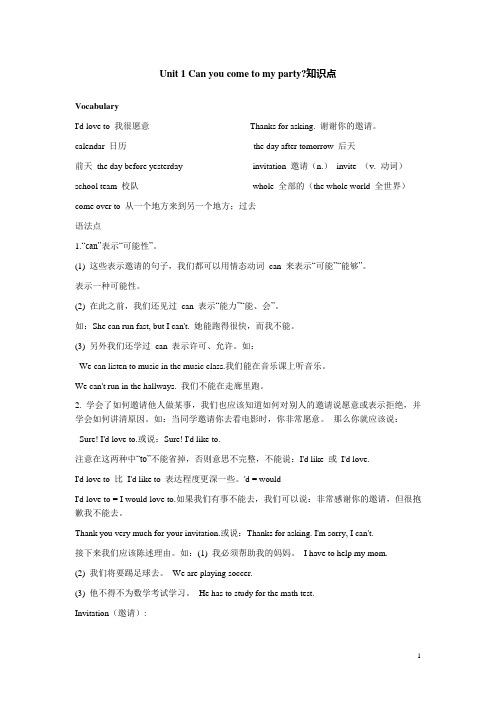
Unit 1 Can you come to my party?知识点VocabularyI'd love to 我很愿意Thanks for asking. 谢谢你的邀请。
calendar 日历the day after tomorrow 后天前天the day before yesterday invitation 邀请(n.)invite (v. 动词)school team 校队whole 全部的(the whole world 全世界)come over to 从一个地方来到另一个地方;过去语法点1.“can”表示“可能性”。
(1) 这些表示邀请的句子,我们都可以用情态动词can 来表示“可能”“能够”。
表示一种可能性。
(2) 在此之前,我们还见过can 表示“能力”“能、会”。
如:She can run fast, but I can't. 她能跑得很快,而我不能。
(3) 另外我们还学过can 表示许可、允许。
如:We can listen to music in the music class.我们能在音乐课上听音乐。
We can't run in the hallways. 我们不能在走廊里跑。
2. 学会了如何邀请他人做某事,我们也应该知道如何对别人的邀请说愿意或表示拒绝,并学会如何讲清原因。
如:当同学邀请你去看电影时,你非常愿意。
那么你就应该说:Sure! I'd love to.或说:Sure! I'd like to.注意在这两种中“to”不能省掉,否则意思不完整,不能说:I'd like 或I'd love.I'd love to 比I'd like to 表达程度更深一些。
'd = wouldI'd love to = I would love to.如果我们有事不能去,我们可以说:非常感谢你的邀请,但很抱歉我不能去。
八年级英语上册 unit 5 can you come to my party知识点总结 人教新目标版
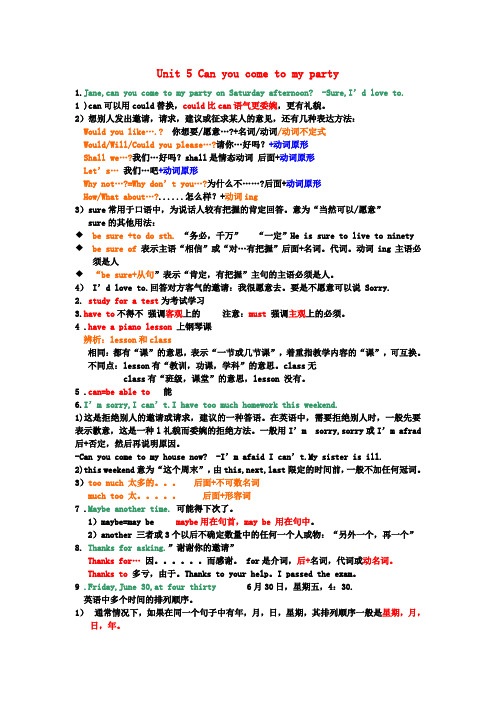
Unit 5 Can you come to my party1.Jane,can you come to my party on Saturday afternoon? -Sure,I’d love to.1 )can可以用could替换,could比can语气更委婉,更有礼貌。
2)想别人发出邀请,请求,建议或征求某人的意见,还有几种表达方法:Would you like….?你想要/愿意…?+名词/动词/动词不定式Would/Will/Could you please…?请你…好吗?+动词原形Shall we…?我们…好吗?shall是情态动词后面+动词原形Let’s… 我们…吧+动词原形Why not…?=Why don’t you…?为什么不……?后面+动词原形How/What about…?......怎么样?+动词ing3)sure常用于口语中,为说话人较有把握的肯定回答。
意为“当然可以/愿意”sure的其他用法:◆be sure +to do sth. “务必,千万” “一定”He is sure to live to ninety◆be sure of 表示主语“相信”或“对…有把握”后面+名词。
代词。
动词ing主语必须是人◆“be sure+从句”表示“肯定,有把握”主句的主语必须是人。
4)I’d love to.回答对方客气的邀请:我很愿意去。
要是不愿意可以说 Sorry.2. study for a test为考试学习3.have to不得不强调客观上的注意:must强调主观上的必须。
4 .have a piano lesson 上钢琴课辨析:lesson和class相同:都有“课”的意思,表示“一节或几节课”,着重指教学内容的“课”,可互换。
不同点:lesson有“教训,功课,学科”的意思。
class无class有“班级,课堂”的意思,lesson 没有。
5 .can=be able to 能6.I’m sorry,I can’t.I have too much homework this weekend.1)这是拒绝别人的邀请或请求,建议的一种答语。
人教版-英语-八上-5单元 Can you come to my party 语法精讲专练)

Unit 5 Can you come to my party?语法精讲can在“邀请”中的用法(1)当用情态动词can发出邀请时,要用其一般疑问句形式Can you/he/they+动词原形……。
can在此表示请求的语气,意为“能;可以”。
例如:Can you come to my party tonight?你今晚能来参加我的聚会吗?Can she go to the concert with us?她能和我们一起去听音乐会吗?(2)表示接受以上邀请,可以说Sure,I’d love to.“当然,我很愿意。
”或Sure,I think she will.“当然,我想她会的。
” 例如:---Can you go shopping with me?你能和我一起去购物吗?---Sure,I’d love to.当然,我很愿意。
(3)表示拒绝邀请时,可以回答I’m sorry.I have to…/I’m+v.-ing…,替他人拒绝邀请时,可回答No,he/she/they can’t.He/She/They…例如:---Can you go to the movies?你去看电影吗?---I’m sorry.I can’t.I have to do homework.对不起,我去不了。
我必须做作业。
---Can he come to my home for dinner?他能来我家吃晚饭吗?---No.he can’t.He is going to visit his grandma.不,他来不了。
他要去看望他的奶奶。
语法专练I.单项填空1.The little boy can _______ English very well.A.speak B.speaks C. to speak D.speaking2.---Can you go to the Great Wall with us next week?--- _______.I have to help my morn.A.Yes,I can B.Sure,I’d lore to C.Sorry,I can’t D.No,I can3.It’s raining outside. I _______stay at home.A. may B.have to C.has to D.can4.Tony _______ his grandpa next Sunday.A.visiting B.visits C.is visiting D.to visit5.---Do you have to go home early?--- No, _______.A. I don’t B.I must C. I do D.haven’tⅡ.完成句子1.你能来参加我的聚会吗?_______ you _______ _______ my party?2.吉姆能和我们一起去宿营吗?_______ Jim _______ _______ _______ us?3.今天我不得不为英语测试而学习。
- 1、下载文档前请自行甄别文档内容的完整性,平台不提供额外的编辑、内容补充、找答案等附加服务。
- 2、"仅部分预览"的文档,不可在线预览部分如存在完整性等问题,可反馈申请退款(可完整预览的文档不适用该条件!)。
- 3、如文档侵犯您的权益,请联系客服反馈,我们会尽快为您处理(人工客服工作时间:9:00-18:30)。
经典例题与讲解:SectionA单元目标预览a trip教材英汉对译Section A 2dJeff:Hey,Nick,can you come to my house on Saturday?My cousin Sam from Xi'an is going to be here.Nick:Oh,Sam!I remember we went bike riding together last fall when he visited you.Jeff:Yes,that's right.Nick:I'd love to come,but I'm afraid I can't.I have an exam on Monday so I must prepare for it.Jeff:That's really too bad!①Oh,but Sam isn't leaving until next Wednesday.②Can you hang out with us on Monday night?Nick:Sure!③Catch you on Monday!杰夫:嘿,尼克,星期六你能来我家吗?我来自西安的表弟萨姆打算到这儿。
尼克:哦,萨姆!我记得去年秋天他来看你时,我们一起骑自行车旅行过。
杰夫:是的,很对。
尼克:我想去,但是恐怕不行。
星期一我有一次考试,所以我必须为此而准备。
杰夫:那真是太糟糕了!哦,但是萨姆直到下周三才要离开。
你可以在周一晚上和我们去闲逛吗?尼克:当然可以了!周一见你们!教材知识详解1.—Jenny,can you come to my party on Saturday afternoon?詹妮,星期六下午你能来参加我的聚会吗?—Sure ,I'd love to.当然,我很愿意。
本句是一般疑问句。
情态动词can 与come 共同构成谓语。
can modal v. 可以,相当于may ,提出请求或邀请Can you get me some water? 你可以给我弄点水吗?can modal v .能;会 Can you sing? 你会唱歌吗?【例题】 Bill ______ come out to play because he ______help his mom in the garden.A .can ;have toB .can ;has toC .can't ;have toD .can't ;has to对不起,我不能。
我得帮助我的父母。
have to 不得不,必须。
表示客观情况要求某人必须做某事,有人称和时态的变化,后接动词原形,其否定形式为don't have to 。
She isn't very well these days and she has to stay at home. 她这些天身体不太好,不得不待在家里。
You don't have to tell me this.你不必告诉我这件事。
have to 和musthave to 强调因客观原因而“不得不”。
它有时态、人称和数的变化。
其第三人称单数为 has to ,过去式为 had to 。
由 have to 构成的句子,进行句型转换时要借助 do ,does 和did 。
It's raining.I have to stay at home. 天在下雨。
我不得不待在家里。
must 强调主观上“必须”,没有人称和数的变化。
其句型变换无需借助助动词。
You must do your homework first. 你必须先做作业。
【例1】选词填空,注意适当形式 must have to1.You don't ______come here today. 2.We ______ late again next time. 3.We ______ strict with ourselves.点拨:1.本句借助助动词do ,应该用have to ,must 不需借助助动词。
2.mustn't 表示个人主观的意愿。
3.must 表示个人主观意愿。
答案:1.have to 2.mustn't be 3.must be 【例2】—Must we clean the classroom? —No ,you______. A .mustn'tB .needC .don't have toD .aren't我必须准备考试。
prepare v. 使做好准备;把……准备好,其名词形式为:preparation准备;准备工作。
(1) 常用短语为:prepare for 为……做准备,相当于get ready for 。
The students are preparing for the coming sports meeting.=The students are getting ready for the coming sports meeting.学生们正在为即将到来的运动会做准备。
(2) prepare...for...为……准备……,相当于get...ready for...。
Mother is preparing a birthday cake for my birthday. =Mother is getting a birthday cake ready for my birthday.妈妈正在为我的生日准备生日蛋糕。
(3) prepare to do sth.准备做某事=get ready to do sth.You should prepare to have the P.E. lesson.=You should get ready to have the P.E. lesson.你应当准备上体育课。
【例1】Tomorrow is Dragon Boat Day.My mother and my grandma ______a big meal for our family now.A.are preparing B.be preparingC.prepare D.prepared点拨:根据时间状语now以及语意可知本句时态用现在进行时。
主语My mother and my grandma是复数,故用are preparing。
答案:A【例2】I'm very busy these st week I ______the driving test.Now I'm ______take part in the coming sports meeting.A.prepared;preparingB.prepared for;preparingC.prepared for;preparing toD.prepared;preparing to点拨:根据last week可知时态用一般过去时;为……做准备用prepare for,故A、D两项不符;prepare to do sth.意为“准备做某事”,故选C项。
答案:C4.I'm sorry,I'm not available.很抱歉,我没空。
available adj. 有空的;可获得的(1) 作“有空的”时,相当于free,不用于名词前。
I'm available next Tuesday if you want to meet then.如果你想见面的话,我下星期二有空。
(2) 作“可获得的”时,常用于名词后。
I am going to send you all the stamps available.我将把我能得到的邮票给你寄去。
【例题】If you are ______ tomorrow,you can bring all the ______.A.available;available newspapersB.available;newspapers availableC.not available;available newspapersD.not available;newspapers available点拨:available作“可获得的”,用于名词后,排除A、C两项;根据“你可以把能得到的所有报纸带来”可知“如果明天你有空”,故排除D项。
答案:B5.①Oh,but Sam isn't leaving until next Wednesday.哦,但是萨姆直到下周三才要离开。
until conj.& prep. 到……时;直到……为止(1) until 用于肯定句中,意为“一直到……为止”,主句谓语动词用延续性动词。
I stayed until he came back.我一直待到他回来为止。
(2) until 用于否定句中,构成not...until,意为“直到……才”,主句谓语动词用短暂性动词,此时until可用before代替。
I won't go there until/before he calls me.直到他给我打电话,我才去那儿。
【例题】Tony didn't feel better ______ he took some medicine.I guess he can go to school this afternoon.A.until B.whenC.after D.because点拨:not...until 意为“直到……才”,句意为“托尼直到吃了一些药才感觉好多了。
我猜他今天下午就能去上学”。
B、C、D三项放在句中不合句意。
答案:A6.②Can you hang out with us on Monday night?你可以在周一晚上和我们去闲逛吗?hang v. 悬挂;垂下,其过去式为:hung。
She hung her washing out in the garden.她把洗的衣服晾在花园里。
hang out 常去某处;泡在某处 They are always hanging out in the street. 他们总是在街上闲逛。
hang v. 吊死;绞死,其过去式为:hanged 。
In the old days ,many people were hanged. 在过去,许多人被绞死。
【例题】 He ______the basket on the wall after entering the room yesterday. A .hang B .hangs C .hungD .hangedCatch you on Monday! 周一见你们!catch v. 及时赶上;接住;抓住,过去式为:caught 。
